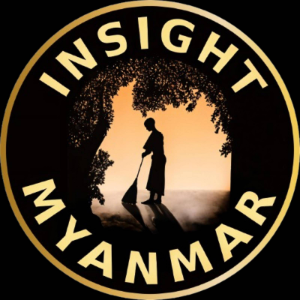
Insight Myanmar
Religion & Spirituality Podcasts
Insight Myanmar is a beacon for those seeking to understand the intricate dynamics of Myanmar. With a commitment to uncovering truth and fostering understanding, the podcast brings together activists, artists, leaders, monastics, and authors to share their first-hand experiences and insights. Each episode delves deep into the struggles, hopes, and resilience of the Burmese people, offering listeners a comprehensive, on-the-ground perspective of the nation's quest for democracy and freedom. And yet, Insight Myanmar is not just a platform for political discourse; it's a sanctuary for spiritual exploration. Our discussions intertwine the struggles for democracy with the deep-rooted meditation traditions of Myanmar, offering a holistic understanding of the nation. We delve into the rich spiritual heritage of the country, tracing the origins of global meditation and mindfulness movements to their roots in Burmese culture. Each episode is a journey through the vibrant landscape of Myanmar's quest for freedom, resilience, and spiritual riches. Join us on this enlightening journey as we amplify the voices that matter most in Myanmar's transformative era.
Location:
United States
Description:
Insight Myanmar is a beacon for those seeking to understand the intricate dynamics of Myanmar. With a commitment to uncovering truth and fostering understanding, the podcast brings together activists, artists, leaders, monastics, and authors to share their first-hand experiences and insights. Each episode delves deep into the struggles, hopes, and resilience of the Burmese people, offering listeners a comprehensive, on-the-ground perspective of the nation's quest for democracy and freedom. And yet, Insight Myanmar is not just a platform for political discourse; it's a sanctuary for spiritual exploration. Our discussions intertwine the struggles for democracy with the deep-rooted meditation traditions of Myanmar, offering a holistic understanding of the nation. We delve into the rich spiritual heritage of the country, tracing the origins of global meditation and mindfulness movements to their roots in Burmese culture. Each episode is a journey through the vibrant landscape of Myanmar's quest for freedom, resilience, and spiritual riches. Join us on this enlightening journey as we amplify the voices that matter most in Myanmar's transformative era.
Language:
English
Email:
burmadhamma@gmail.com
Between Here and Home
Duration:02:54:58
Framing the Dead
Duration:01:05:18
When Spiders Unite
Duration:02:24:11
Children of the Revolution
Duration:01:29:59
A Scanner Darkly
Duration:00:52:29
Against Injustice
Duration:02:09:29
No Space for Dictators
Duration:01:05:34
Far From Home
Duration:02:00:21
Leaving the Tradition
Duration:02:54:14
Ghosts in the Machine
Duration:02:14:21
A Doctor Without Borders
Duration:01:35:49
Inside the Digital Siege
Duration:01:11:51
The Long Stalemate
Duration:01:14:49
Across the Universe
Duration:02:29:16
Scamland
Duration:01:21:16
Hit ’Em Up
Duration:02:16:07
The Long Baht Home
Duration:00:42:30
From Rio to Rangoon
Duration:01:06:34
Trajectories in Flux
Duration:02:41:51
Meditating on History
Duration:01:36:48